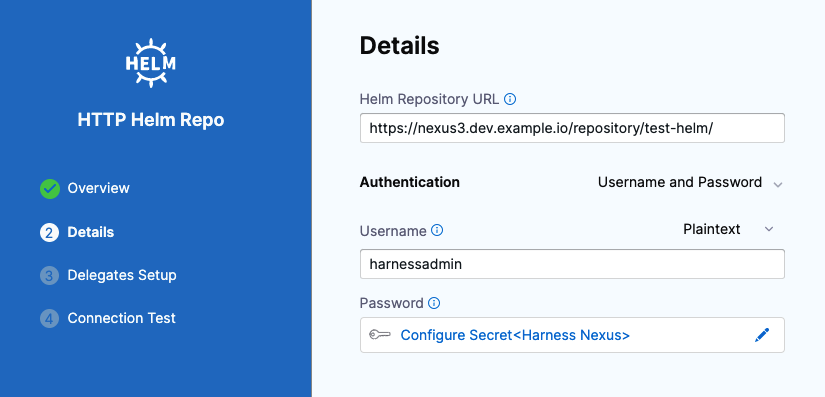HTTP Helm repository connector settings reference
This topic provides settings and permissions for the HTTP Helm Repo Connector.
You can add a Helm Chart Repository as an Artifact Server and then use it in Harness Kubernetes and Helm deployments. See Helm CD Quickstart.
A Helm chart repository is an HTTP server that houses an index.yaml file and, if needed, packaged charts. For details, see The Chart Repository Guide from Helm.
For instructions on how to use this Connector to perform specific tasks, see Helm CD Quickstart.
Limitations
For Helm charts stored in repos such as Amazon S3 or GCS (Google Cloud Storage), you will need a Cloud Provider for that account. For more information, see Cloud Platform Connectors.
Name
The unique name for this Connector.
ID
See Entity Identifier Reference.
Description
Text string.
Tags
See Tags Reference.
Helm Repository URL
The URL of the chart repo.
Helm Hub at https://hub.helm.sh is not a Helm repo. It is a website for discovery and documentation. While it does list charts for deployments such cluster-autoscaler, the actual Helm repo for this and most charts is https://kubernetes-charts.storage.googleapis.com.If you're having trouble connecting, try adding a trailing slash (/) to the URL, like https://nexus3.dev.example.io/repository/test-helm/.
Some chart servers, like Nexus, require a trailing slash.

Username and Password
From Helm:
Note: For Helm 2.0.0, chart repositories do not have any intrinsic authentication. There is an issue tracking progress in GitHub.
Because a chart repository can be any HTTP server that can serve YAML and tar files and can answer GET requests, you have a plethora of options when it comes down to hosting your own chart repository. For example, you can use a Google Cloud Storage (GCS) bucket, Amazon S3 bucket, Github Pages, or even create your own web server.
If the charts are backed by HTTP basic authentication, you can also supply the username and password. See Share your charts with others from Helm.